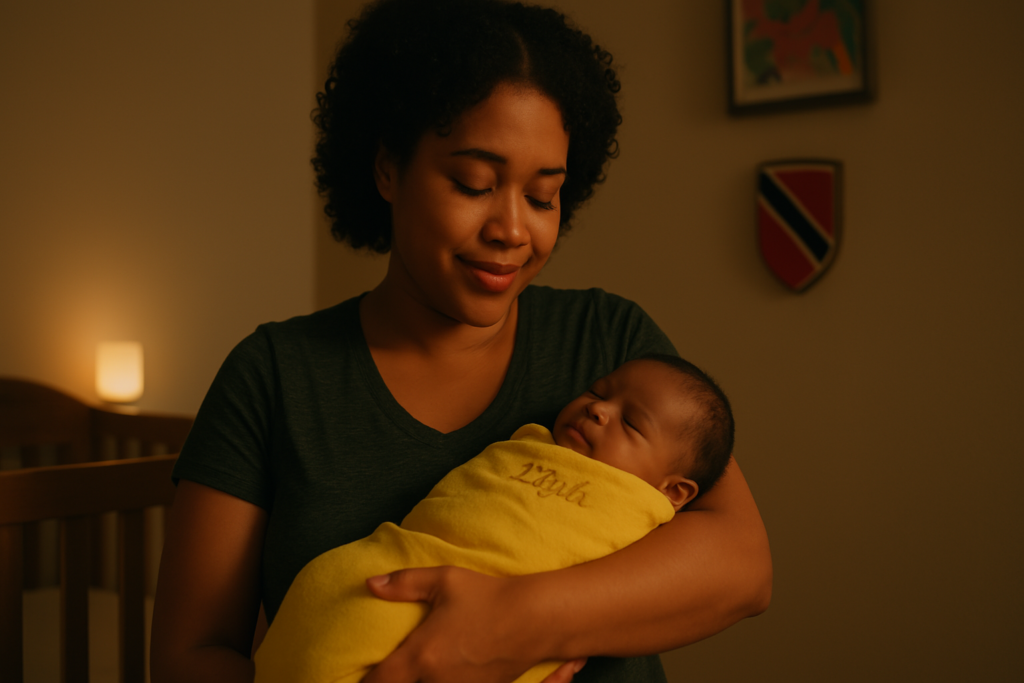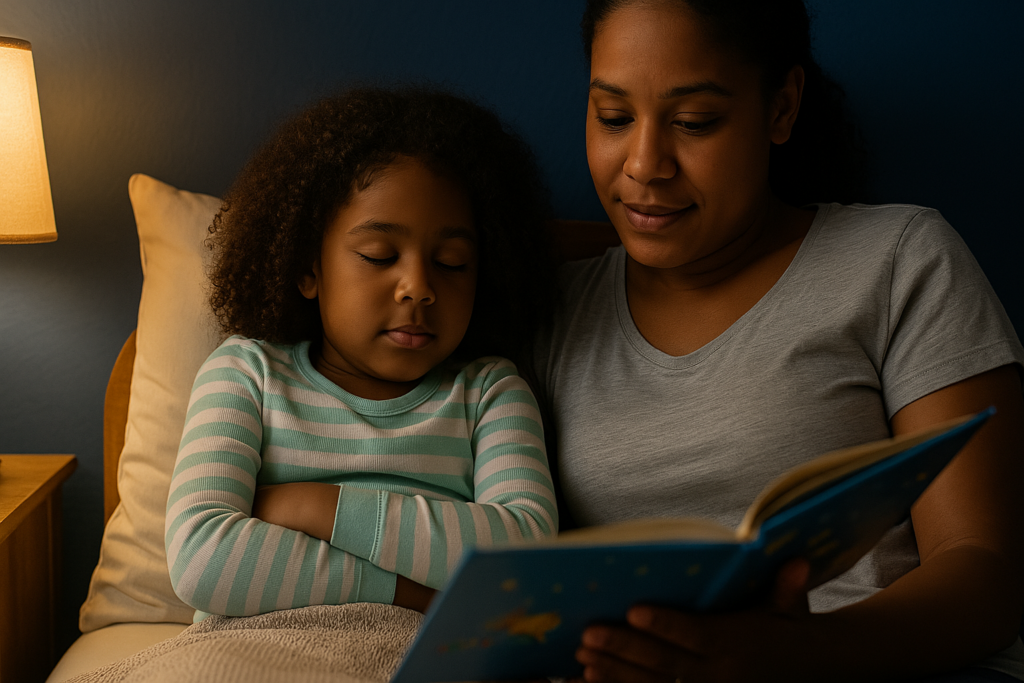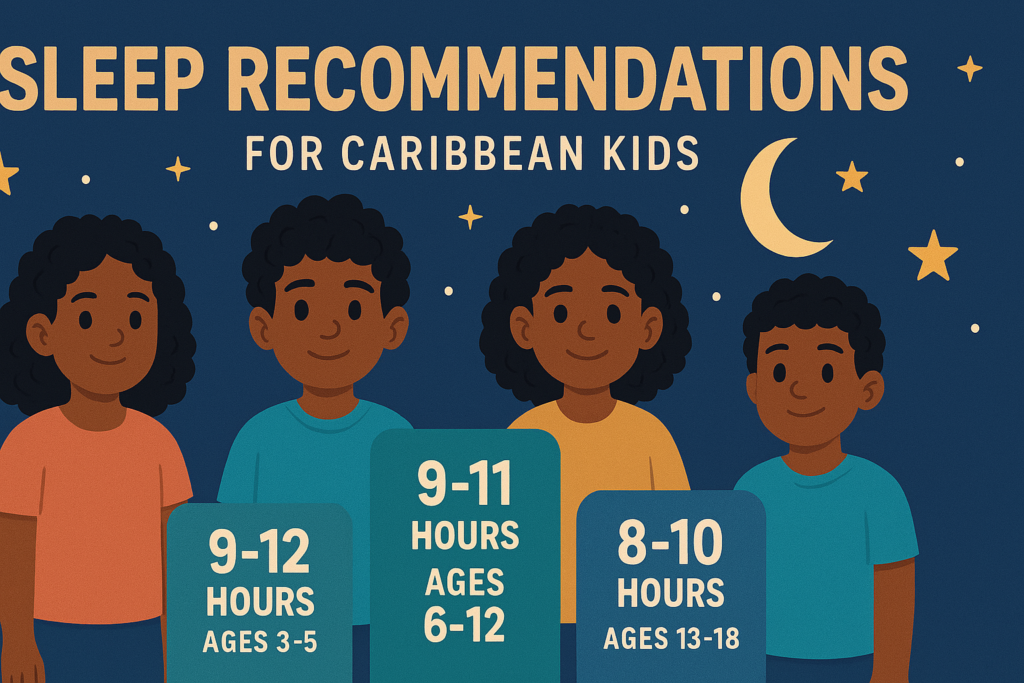Ensuring that children get adequate and quality sleep is vital for their physical health, emotional well-being, and cognitive development. Sleep is a cornerstone of good health, helping children grow, develop, and thrive. In the Caribbean, where cultural practices and environmental factors may influence sleep patterns, it’s important to understand the unique sleep needs of children and how to create environments and routines that foster good sleep habits.
In this blog, we will explore why sleep is important for children, discuss how much sleep children need at different ages, offer tips for improving sleep hygiene, and provide strategies for tackling the specific sleep challenges faced by Caribbean families. From creating a conducive sleep environment to understanding the cultural dynamics around sleep, this guide will help parents ensure their children sleep soundly every night.
Understanding the Sleep Requirements by Age
Children’s sleep needs change over time, and understanding these differences can help you provide the best possible sleep for your child. Sleep requirements vary based on their age, and they are crucial for proper development, brain function, emotional regulation, and overall well-being.

Infants (4–12 months)
Infants need the most sleep in their early months. At this stage, babies sleep for about 12–16 hours over a 24-hour period, which includes both nighttime sleep and daytime naps. Infants at this age typically experience sleep cycles that last about 2-4 hours, and they wake up for feedings or diaper changes.
Tips for Better Sleep:
-
Establish a consistent bedtime routine: Develop a soothing bedtime routine to help your baby recognize when it’s time to sleep. A warm bath, a lullaby, or a gentle massage can signal to the infant that sleep time is approaching.
-
Create a safe sleep environment: Put babies to sleep on their backs in a crib or bassinet free of pillows, blankets, and stuffed animals to reduce the risk of suffocation and Sudden Infant Death Syndrome (SIDS).
-
Consider nap schedules: Newborns need multiple naps throughout the day. Although they may not follow a strict sleep schedule, try to offer naps at regular intervals to avoid overtiredness.
Toddlers (1–2 years)
Toddlers require 11-14 hours of sleep per day, which includes both night sleep and one or two naps. At this age, toddlers are more likely to have irregular sleep patterns, especially as they start to assert independence and experience separation anxiety from parents.
Tips for Better Sleep:
-
Consistent sleep schedule: Set a consistent bedtime and wake-up time for your toddler. Regular sleep routines help set the internal body clock and improve the child’s sleep quality.
-
Reduce screen time: Limit screen exposure before bedtime. The blue light emitted from phones, tablets, and televisions can interfere with the production of melatonin, the hormone responsible for sleep regulation.
-
Calming bedtime rituals: Engage in calming activities, such as reading a story or playing soft music, to help toddlers wind down before bed.

Preschoolers (3–5 years)
Preschoolers need about 10–13 hours of sleep every day. At this age, children typically sleep through the night but may still require one afternoon nap. Sleep disruptions are common during this phase due to changes in their social, cognitive, and emotional development.
Tips for Better Sleep:
-
Set clear sleep boundaries: As your child begins to understand rules, establish a clear bedtime routine that reinforces good sleep habits. Make sure the bedtime ritual is quiet and calm, free from stimulating activities like playing with toys or watching television.
-
Comfort objects: A favorite stuffed animal or blanket can provide comfort and security to help preschoolers sleep peacefully through the night.
-
Address nighttime fears: Many preschoolers develop fears of the dark or separation anxiety. You can ease these fears by using a nightlight or leaving a door open, and reassure them that you are nearby.
School-Aged Children (6–12 years)
School-aged children typically require 9–12 hours of sleep per night. At this age, children are often busy with schoolwork, extracurricular activities, and social events, which can lead to sleep deprivation. It’s essential to balance these activities with the need for adequate rest.
Tips for Better Sleep:
-
Prioritize sleep schedules: Encourage your child to go to bed early enough to get sufficient sleep each night. A good bedtime routine can include calming activities such as reading, light stretching, or a warm shower.
-
Monitor caffeine intake: Avoid giving children caffeinated beverages in the afternoon or evening, as caffeine can disrupt their sleep patterns.
-
Create a relaxing environment: School-aged children may be stressed with homework or other responsibilities. A quiet, dark, and cool room will help them relax and fall asleep more easily.

Teenagers (13–18 years)
Teenagers need 8–10 hours of sleep each night, though studies show that many teenagers only get an average of 6–7 hours of sleep. Teenagers’ sleep cycles are influenced by biological changes, including shifts in their circadian rhythm. As a result, many teenagers naturally feel more awake later in the evening and may resist going to bed early.
Tips for Better Sleep:
-
Encourage a consistent bedtime: Even though teenagers are biologically inclined to stay up late, encouraging a consistent bedtime and wake-up time can help them maintain a balanced sleep schedule.
-
Limit late-night screen use: Teenagers often use phones and computers late into the night, which can disrupt their sleep quality. Encourage a “no screens” rule at least an hour before bedtime to help them unwind naturally.
-
Promote relaxation: Encourage teenagers to engage in relaxing activities, such as journaling or meditation, to help relieve stress before sleep.
The Importance of Consistent Sleep Schedules
Sleep consistency is essential for all age groups. A set sleep schedule helps regulate the body’s circadian rhythm and improves the overall quality of sleep. Regular bedtimes and wake-up times make it easier for children to fall asleep and wake up feeling refreshed. This routine is especially important for families living in the Caribbean, where factors like environmental noise, cultural practices, and social events can interfere with consistent sleep.
Strategies for Maintaining Consistency:
-
Stick to a regular bedtime routine: Whether it’s reading a bedtime story or taking a warm bath, doing the same thing every night helps your child signal that it’s time to sleep.
-
Be patient: It may take some time for children to adjust to a consistent sleep routine, but over time, the benefits will outweigh the challenges.
.

Managing Sleep During Vacations and Holidays
In the Caribbean, families often travel for holidays or special occasions, and this can disrupt sleep schedules. Whether it’s traveling across the islands or going to another country, adjusting to new time zones and environments can lead to sleep challenges for children.
Strategies for Maintaining Sleep During Travel:
-
Stick to familiar routines: Keep bedtime and wake-up time as close to the usual schedule as possible.
-
Pack familiar sleep items: Bring along a favorite blanket, pillow, or stuffed animal to provide comfort in a new environment.
-
Adjust to new time zones gradually: If you’re traveling across time zones, adjust your child’s sleep schedule a few days before departure to minimize jet lag.
Recognizing Sleep Problems and Seeking Help
Despite your best efforts to establish a consistent sleep routine, some children may experience sleep problems. This can include difficulty falling asleep, frequent waking, night terrors, or excessive sleepiness during the day. If your child shows signs of sleep disorders, it’s important to consult a healthcare professional.
Common signs of sleep disorders include:
-
Difficulty falling asleep or staying asleep
-
Snoring or irregular breathing during sleep
-
Excessive daytime sleepiness or fatigue
-
Bedwetting beyond age-appropriate stages
-
Night terrors or nightmares
Healthy sleep is essential for every child’s development, and promoting good sleep habits should be a priority for Caribbean families. Understanding your child’s sleep needs based on their age, creating a conducive sleep environment, and addressing cultural practices can go a long way in ensuring your child enjoys restorative, quality sleep. By incorporating these strategies, parents can help their children grow, learn, and thrive. So, create a safe, calm, and consistent sleep routine, and rest assured that your child will reap the many benefits of good sleep for years to come.
.


